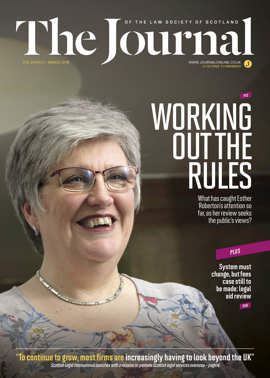Opinion: Derek McCabe

It’s a peculiar thing to be writing in a journal for the legal profession on the topic of human rights and addiction. This is largely to do with Reach Advocacy’s humble beginnings and lived experience of mental health and substance use disorders.
The population with whom we work present many concurrent ongoing issues, and some of these can be situated within the human rights framework. Typically, we see people from the most impoverished communities who experience serious challenges in life. Their use of alcohol and/or drugs at harmful levels becomes the singular focus of attention of the viewing world. However, the distillation of their complex issues down to the single label of addiction belies the magnitude of their experiences.
This labelling process inadvertently impacts on issues of human rights. The most common areas of rights we see being challenged through this process are: articles 3 (prohibition of inhuman or degrading treatment), 8 (right to respect for private and family life), 6 (right to fair trial) and 14 (prohibition of discrimination). Other areas of human rights enshrined in the International Covenant of Economic, Social and Cultural Rights (1976), such as the right to health, housing, education, and employment, also suffer because of the negatively weighted label of addiction.
When researching for course content for our Advocacy Practice Award we were struck by the work of Elie Wiesel, a survivor of the Holocaust and staunch promoter of human rights. He wrote about the concept of “neutrality” and how bystanders adopting this approach can help to create the social conditions allowing marginalisation of a group to take place.
This sentiment is captured in the Universal Declaration of Human Rights (1948), article 29: we all have a responsibility to the people around us and should protect their rights and freedoms. In our work, we attempt to highlight the factors that can lead to the discrimination of people with mental health and substance-use disorders and the impact it has on their right to health. Last year we saw drug and alcohol deaths reach 2,132 in Scotland, and if we include suicides the figure reaches 3,060.
Another significant challenge facing this population is the gap between knowing about human rights and enacting these. This is an area that requires significant change. At times, others will need to support them in gaining an understanding of human rights and how best to exercise these.
We developed our advocacy award (SCQF Level 7) to help make rights a reality for those with mental health and substance use disorders. Some of the most vulnerable in our society don’t know their rights. Our SQA-accredited award allows candidates to learn the language of human rights in everyday life and to recognise when their rights are being challenged. It aims to redress some of the power imbalance inherent in large social institutions by promoting the “right to health” and the social determinants of health. In a sense we have brought the work of Martha Nussbaum on Capabilities and Human Rights to the fore in the addiction and mental health field.
By using a human rights framework, we are able to discuss the concept of responsibilities at the individual and social level, underlining the importance and benefits of education. A rights-based and person-centred approach across all institutions is vital to make sure everyone is allowed to access their human rights.
We believe the legal profession has a central role to play in supporting this population by increasing opportunities for them to know and understand human rights. By doing so, you become instrumental in bridging the gap in knowledge that currently exists, enabling them to attain the basic rights and freedoms enshrined in the Human Rights Act 1998.
In this issue
- Borrowings, partner capital and profitability
- GDPR and the cloud
- Employment claims: is the flood still to come?
- Contributory fault: drivers, cyclists and pedestrians
- Reading for pleasure
- Opinion: Derek McCabe
- Book reviews
- Profile: Siobhan Kahmann
- President's column
- Application changes coming
- People on the move
- Seeking a better way
- Beyond borders
- Drawings and profitability
- Enforceable rights or progressive policy goals?
- Conflict theory: it works
- What the liquidators don't tell you
- The office on the move
- Please can we have some more?
- Health check for doctors' lines
- When creditors come first
- Keeping goods exclusive
- Tenant Farming Commissioner: the story so far
- HSE appeals: experts allowed in
- Scottish Solicitors' Discipline Tribunal
- Please don't stop the music
- Broadcasting's business end
- Public policy highlights
- Scam warnings escalate
- This time it's personal
- The game's not a bogey!
- "Only amateurs attack machines; professionals target people"
- When estate agents need client ID
- Banks, client accounts and the Money Laundering Regulations
- Third party rights: what now?
- Ask Ash






